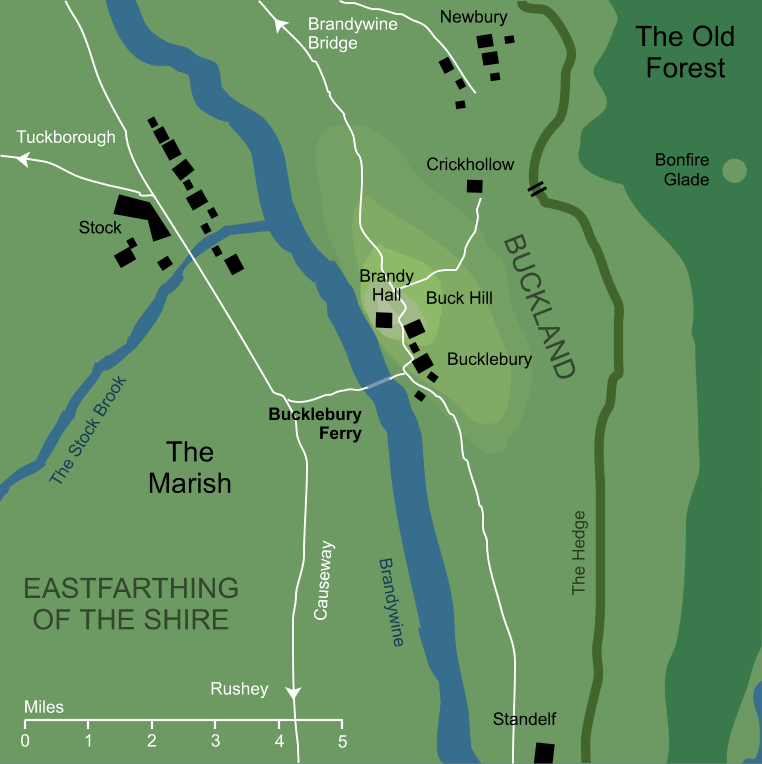- Cities and buildings
- Fields, plains and deserts
- Forests
- Hills and mountains
- Islands and promontories
- Lands, realms and regions
- Rivers and lakes
- Seas and oceans


|
||||||||||
|


Which personality type are you?
Take the Free mydiscprofile Personality Test to discover your core personality and your ideal job.   Which personality type are you? |
|
Dates
Location
Twenty miles to the south of the Brandywine Bridge, crossing the Brandywine close to Bucklebury and Brandy Hall
Race
Culture
Settlements
Indexes: About this entry:
|
Bucklebury FerryThe ferry across the Brandywine into Buckland
Bucklebury Ferry across the Brandywine1
Bucklebury Ferry across the Brandywine1
A ferry crossing on the wide river Brandywine, connecting the Marish region of the Shire's Eastfarthing with Buckland across the river. On the Buckland side of the river (that is, the eastern bank) the ferry docked at a platform serving the town of Bucklebury beneath Buck Hill, and from this the ferry took its name. This eastern Bucklebury landing lay beneath a steep stretch of river bank, and a winding pathway climbed up the bank from the dock into the township itself. On the opposite bank to the west, there was no village or settlement of any kind.2 The ferry docked at a simple landing platform reaching out into the river, lit by a pair of burning torches. From this platform, a neat path ran westwards, lined with whitewashed stones. The lane ran for about a hundred yards before it reached the main Causeway through the Marish, at a point about halfway between Stock to the north and Rushey to the south, where it was marked by two white posts. The ferry boat itself was large and flat, propelled through the water by a long pole.3 There was no ferryman (at least, none is recorded); rather, passengers would sail the ferry themselves from one side of the river to the other.4 Bucklebury Ferry played a small but important part in the War of the Ring. Before Frodo Baggins began his fateful journey from Bag End, his friend Meriadoc Brandybuck had set out by cart to transport Frodo's belongings to the his new house in Buckland. He then rode a pony back from the house at Crickhollow down to Bucklebury, and rafted across the Brandywine aboard the ferry. Thus Frodo and his party found the ferry waiting for them at the landing stage on the western bank. The Hobbits crossed the River, but it was only when they reached the other side that they realised how close they had come to disaster. On the western bank - the bank from which they had just departed - they saw the dark figure of a Black Rider. With the ferry now docked on the eastern bank, and no other means of crossing within twenty miles, the pursuing Rider was foiled and the Hobbits were able to follow their plan to slip secretly out of the Shire. Notes
See also...Bridge of Stonebows, Buckland Gate, Eastfarthing of the Shire, Khamûl, Maggot’s Lane, North-gate, River Baranduin, Second Chief, The Stock-brook, Woodhall Indexes: About this entry:
For acknowledgements and references, see the Disclaimer & Bibliography page. Original content © copyright Mark Fisher 1998, 2001, 2007, 2017, 2019. All rights reserved. For conditions of reuse, see the Site FAQ. Website services kindly sponsored by Discus from Axiom Software Ltd.Quick, simple and effective, it's easy to see why DISC is such a popular profiling solution. |